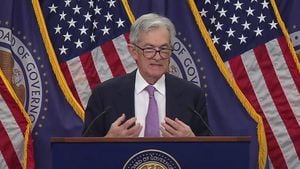Recent discussions surrounding former President Donald Trump’s potential re-election have ignited intense reactions across party lines and public spheres. Given the unpredictability of the political climate today, opinions vary widely about what another Trump term could mean for the nation.
Many Republican supporters are rallying behind Trump, echoing sentiments of bringing back his policies, particularly those focusing on economic growth and deregulation. Advocates claim his first presidency led to historic lows in unemployment rates and significant stock market surges. They argue his approach to trade tariffs, especially with China, bolstered American manufacturing and encouraged job creation domestically. Supporters are vocal about their desire to “Make America Great Again” by returning to policies they believe led to previous economic successes.
On the flip side, Democratic leaders and many voters express stark concerns about what another Trump term could entail. They reference his divisive rhetoric, particularly concerning race, immigration, and climate change as detrimental to social cohesion and international relations. Critics argue his presidency sowed discord and undermined public trust in institutions. According to various recent polls, significant portions of the electorate worry about potential damages to democratic norms if Trump returns to the Oval Office.
Further complicate matters is the legal troubles Trump faces as he approaches the election. Allegations related to mishandling classified documents, as well as other criminal inquiries, are resurfacing and raising questions about his eligibility. Some of his supporters insist these issues are politically motivated, citing them as attempts by the establishment to dethrone a populist leader. They rally around his statement, "They’re not after me, they’re after you. I’m just in the way," indicating the belief among some of his base members is he’s fighting on their behalf against powerful forces.
The younger generation, meanwhile, holds mixed views on Trump's potential return. Many younger voters who previously leaned toward progressive causes express confusion and frustration, citing climate change policies, access to education, and equity issues as top priorities. While some remain steadfast supporters of Biden or potential progressive candidates, others exhibit uncertainty about the future and the direction of the Republican party. This demographic’s engagement, or lack thereof, could be pivotal on election day.
Right-wing media, including popular social media platforms and conservative talk radio, has become the battlefield for ideas and perceptions about Trump's candidacy. Shows devoted to political analysis have seen spikes in viewership as they dissect every development related to Trump's campaign. The narratives presented often fuel discussions on loyalty and betrayal within the party and the broader implication of nominating Trump again. Guests on these shows discuss voter mobilization strategies, laying groundwork for the 2024 election.
Internally, the Republican party faces its own tensions related to Trump's possible candidacy. There are GOP members who openly disavow Trump, leaning toward alternative candidates who signify what they term as “traditional Republican values.” Figures like former Vice President Mike Pence and Governor Ron DeSantis are seen as testing the waters for contention against Trump’s revival. The struggle between Trump loyalists and traditionalist Republicans may shape who eventually emerges as the party’s nominee.
The prospect of Trump combating Biden again signifies heightened stakes not just for the candidates but the country. Both figures symbolize different ideologies: Trump representing populist conservatism, characterized by transactional diplomacy and nationalistic policies, and Biden embodying institutional stability through traditional liberalism. What remains clear is how this juxtaposition will continue to evoke passionate discourse among constituents.
Certain think tanks and political analysts foresee significant impact based on demographic shifts observed during the last election. Women, minorities, and younger voters’ growing prevalence may influence whether Trump’s rhetoric resonates or alienates. Observations suggest many voters are seeking authenticity and sincerity from their leaders, concepts Trump’s camp stresses but often critics challenge.
The intertwining narratives surrounding Trump's possible second term evoke fears, hope, and uncertainty. Engagement from both sides of the aisle is expected to intensify as groups form and develop platforms to advocate either for or against Trump’s return. With the political calendar heating up, each event will likely play out dramatically on social media and through civil discourse, setting the stage for what perhaps will be one of the most contentious elections the United States has seen.
Expectations aside, one thing is certain: the discourse about Trump’s candidacy is far from over and is poised to evolve as the 2024 elections draw nearer. Citizens and leaders alike continue to grapple with the overarching question: What does the future hold if Trump re-emerges?



